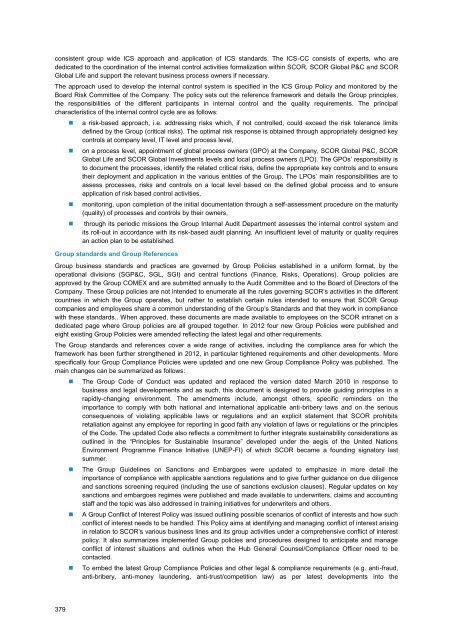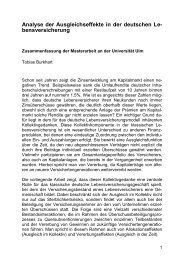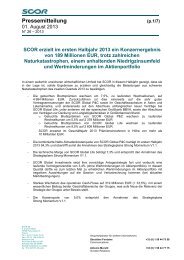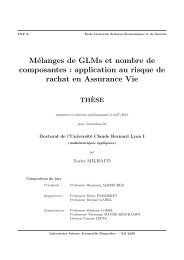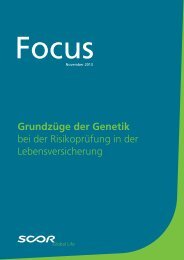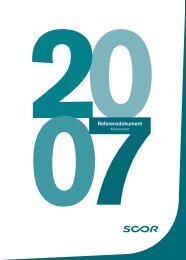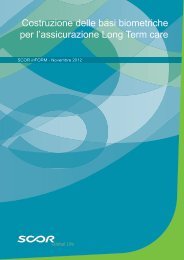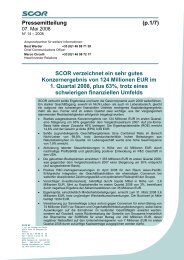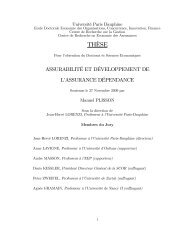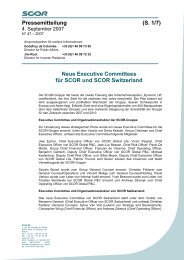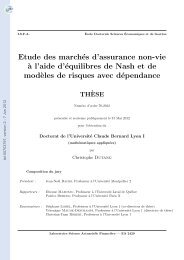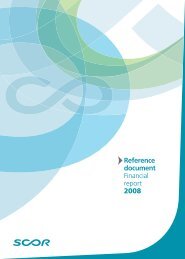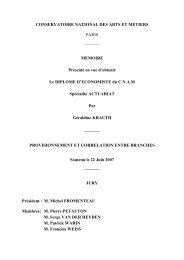4.4 Legal risk - Scor
4.4 Legal risk - Scor
4.4 Legal risk - Scor
You also want an ePaper? Increase the reach of your titles
YUMPU automatically turns print PDFs into web optimized ePapers that Google loves.
consistent group wide ICS approach and application of ICS standards. The ICS-CC consists of experts, who are<br />
dedicated to the coordination of the internal control activities formalization within SCOR, SCOR Global P&C and SCOR<br />
Global Life and support the relevant business process owners if necessary.<br />
The approach used to develop the internal control system is specified in the ICS Group Policy and monitored by the<br />
Board Risk Committee of the Company. The policy sets out the reference framework and details the Group principles,<br />
the responsibilities of the different participants in internal control and the quality requirements. The principal<br />
characteristics of the internal control cycle are as follows:<br />
• a <strong>risk</strong>-based approach, i.e. addressing <strong>risk</strong>s which, if not controlled, could exceed the <strong>risk</strong> tolerance limits<br />
defined by the Group (critical <strong>risk</strong>s). The optimal <strong>risk</strong> response is obtained through appropriately designed key<br />
controls at company level, IT level and process level,<br />
• on a process level, appointment of global process owners (GPO) at the Company, SCOR Global P&C, SCOR<br />
Global Life and SCOR Global Investments levels and local process owners (LPO). The GPOs’ responsibility is<br />
to document the processes, identify the related critical <strong>risk</strong>s, define the appropriate key controls and to ensure<br />
their deployment and application in the various entities of the Group. The LPOs’ main responsibilities are to<br />
assess processes, <strong>risk</strong>s and controls on a local level based on the defined global process and to ensure<br />
application of <strong>risk</strong> based control activities,<br />
• monitoring, upon completion of the initial documentation through a self-assessment procedure on the maturity<br />
(quality) of processes and controls by their owners,<br />
• through its periodic missions the Group Internal Audit Department assesses the internal control system and<br />
its roll-out in accordance with its <strong>risk</strong>-based audit planning. An insufficient level of maturity or quality requires<br />
an action plan to be established.<br />
Group standards and Group References<br />
Group business standards and practices are governed by Group Policies established in a uniform format, by the<br />
operational divisions (SGP&C, SGL, SGI) and central functions (Finance, Risks, Operations). Group policies are<br />
approved by the Group COMEX and are submitted annually to the Audit Committee and to the Board of Directors of the<br />
Company. These Group policies are not intended to enumerate all the rules governing SCOR’s activities in the different<br />
countries in which the Group operates, but rather to establish certain rules intended to ensure that SCOR Group<br />
companies and employees share a common understanding of the Group’s Standards and that they work in compliance<br />
with these standards.. When approved, these documents are made available to employees on the SCOR intranet on a<br />
dedicated page where Group policies are all grouped together. In 2012 four new Group Policies were published and<br />
eight existing Group Policies were amended reflecting the latest legal and other requirements.<br />
The Group standards and references cover a wide range of activities, including the compliance area for which the<br />
framework has been further strengthened in 2012, in particular tightened requirements and other developments. More<br />
specifically four Group Compliance Policies were updated and one new Group Compliance Policy was published. The<br />
main changes can be summarized as follows:<br />
• The Group Code of Conduct was updated and replaced the version dated March 2010 in response to<br />
business and legal developments and as such, this document is designed to provide guiding principles in a<br />
rapidly-changing environment. The amendments include, amongst others, specific reminders on the<br />
importance to comply with both national and international applicable anti‐bribery laws and on the serious<br />
consequences of violating applicable laws or regulations and an explicit statement that SCOR prohibits<br />
retaliation against any employee for reporting in good faith any violation of laws or regulations or the principles<br />
of the Code. The updated Code also reflects a commitment to further integrate sustainability considerations as<br />
outlined in the “Principles for Sustainable Insurance” developed under the aegis of the United Nations<br />
Environment Programme Finance Initiative (UNEP-FI) of which SCOR became a founding signatory last<br />
summer.<br />
• The Group Guidelines on Sanctions and Embargoes were updated to emphasize in more detail the<br />
importance of compliance with applicable sanctions regulations and to give further guidance on due diligence<br />
and sanctions screening required (including the use of sanctions exclusion clauses). Regular updates on key<br />
sanctions and embargoes regimes were published and made available to underwriters, claims and accounting<br />
staff and the topic was also addressed in training initiatives for underwriters and others.<br />
• A Group Conflict of Interest Policy was issued outlining possible scenarios of conflict of interests and how such<br />
conflict of interest needs to be handled. This Policy aims at identifying and managing conflict of interest arising<br />
in relation to SCOR’s various business lines and its group activities under a comprehensive conflict of interest<br />
policy. It also summarizes implemented Group policies and procedures designed to anticipate and manage<br />
conflict of interest situations and outlines when the Hub General Counsel/Compliance Officer need to be<br />
contacted.<br />
• To embed the latest Group Compliance Policies and other legal & compliance requirements (e.g. anti-fraud,<br />
anti-bribery, anti-money laundering, anti-trust/competition law) as per latest developments into the<br />
379


